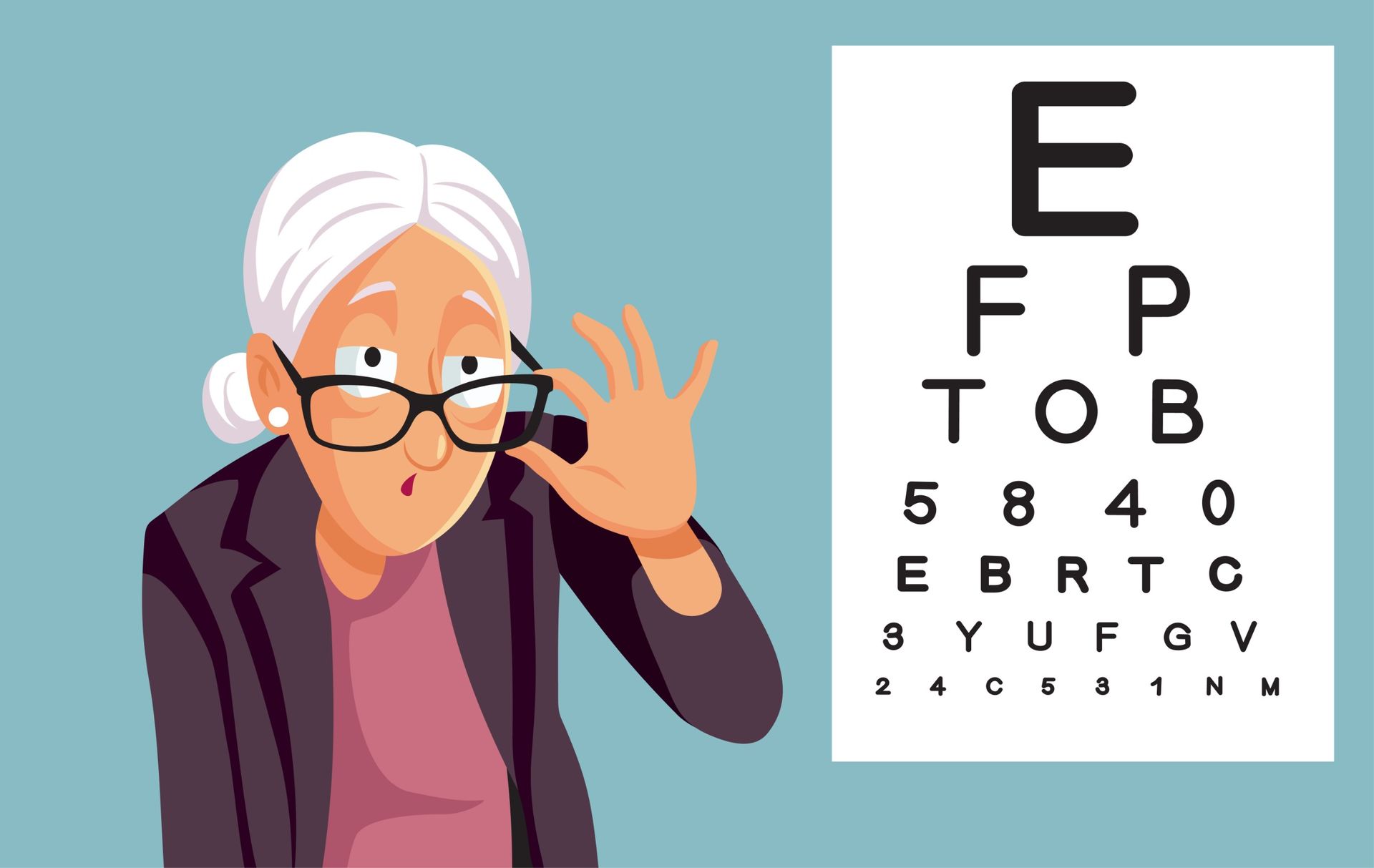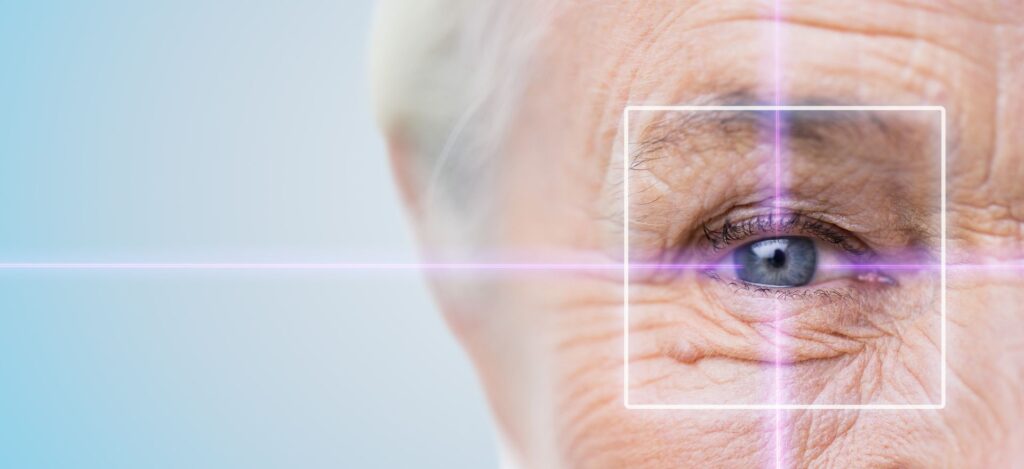The natural aging process has its ups and downs. On one hand, it provides us with wisdom, experience, purpose, memories, and other positive things that enrich our lives. On the other hand, aging welcomes us to a world of disease, illness, injury, and other health conditions that negatively affect our quality of life.
Our eyes are no different. As much as we would love for our eyes to withstand the test of time, changes to our vision and eye health are almost inevitable as we age. In fact, nearly half of all Americans will have cataracts by age 75, and 1 in 10 Americans will have age-related macular degeneration (AMD) by age 80.
Considering how many people are already at an increased risk of developing eye disease, maintaining a good relationship with your eye doctor only becomes more and more important as you age. Not only can they help detect eye disease in its earliest stage, but they can treat it and even prevent it in some cases.

Common Eye Problems Among Seniors
While eye problems can occur at any age, they become much more prevalent as we age. This can start as early as 40 years old in some people, but generally grows much worse as we enter our 50s and 60s. Understanding your risks and how to overcome them is vital to slowing down the rate of ocular decline.
For starters, let’s take a look at some of the most common eye problems in the senior community:
- Cataracts – clouding of the lens that happens when proteins in the eye’s natural lens break down and clump together (resulting in clouded vision).
- Glaucoma – a group of diseases characterized by damage to the optic nerve, usually caused by an increase in intraocular pressure (eye pressure).
- Dry Eye Syndrome – the eyes produce fewer tears as we age, and the quality of our tears can also decrease, which often results in dry eyes.
- Age-Related Macular Degeneration (AMD) – the macula, which is located in the back of the eye (retina), starts to deteriorate as we age (resulting in a loss of central vision).
- Diabetic Retinopathy – a common complication among diabetes patients with high blood pressure that occurs when the blood vessels in the back of the eye (retina) are damaged.
- Floaters – small black spots that appear in your visual field and resemble bugs walking across a TV screen (can be a medical emergency if accompanied by flashes of light).
The most common symptoms of eye problems in seniors include vision loss, reduced depth perception, light sensitivity, loss of color vision, dry eyes, blurry vision, difficulty driving at night, and frequent glaring. Not all eye conditions present symptoms at first, which is why you should visit your eye doctor regularly.

Eye Health Tips for Aging Adults
Taking care of the eyes is important no matter what age you are, but eye care for aging adults is a much more delicate and sensitive process – largely due to the increased risk of age-related eye diseases and worsening vision symptoms. Treatments and surgeries can help, but that 5-star treatment has to continue at home.
Here are some things the senior community can start doing today for healthy eyes as you age:
- Avoid tobacco products and excessive alcohol
- Eat a well-balanced diet and maintain a healthy weight
- Wear sunglasses on sunny days and protective eyewear when necessary
- Stay physically active and exercise regularly (even if it’s just a walk outside)
- Maintain adequate lighting when indoors – don’t be afraid to let in that natural light!
- Make sure you’re giving your eyes a break when staring at a screen
- Maintain a clean and organized environment to avoid slips and falls (which can result in an eye injury)
- Use eye drops (artifical tears) whenever necessary and take prescription medications when recommended by your doctor
- Maintain a healthy sleeping pattern and make sure you’re getting quality sleep each night
While most healthy adults can get away with visiting their eye doctor every 2-3 years, that’s not the case with the senior community. To ensure eye diseases are detected and diagnosed in their earliest stages, we recommend visiting your eye doctor once per year after you turn 65 – unless directed otherwise.

Driving Safely as You Age
By the age of 60, most people will find it difficult to drive a vehicle – especially with low vision at night. Not seeing road signs clearly, difficulty reading your GPS or speedometer, difficulty judging speed and distance, not seeing colors properly, loss of peripheral vision, frequent glaring – seniors have to be extra cautious on the road.
Let’s take a look at some driving-specific tips for seniors experiencing age-related vision changes:
- Proceed with caution when entering or exiting an intersection
- Make sure you’re looking both ways to compensate for loss of peripheral vision
- Try to avoid driving at night and limit yourself to daytime driving
- Avoid speeding at all costs, but don’t go too slow either
- Take a driving course for seniors to prepare yourself for the challenges you’ll face
Vision loss and impairment don’t only happen on the road. If you’re finding it difficult to see things at home, consider investing in a magnifying lens to see your phone or book more clearly. Buying books with large print and changing your phone settings can also help – talk to your doctor for more useful advice.
Contact Milwaukee Eye Surgeons Today!
Are you having a hard time seeing things clearly? Have you started experiencing vision loss in one or both of your eyes? Do you have blurry, distorted, hazy, or cloudy vision? Are your vision problems starting to impact your ability to live a happy, healthy, and rewarding life? If so, then you came to the right place.
At Milwaukee Eye Surgeons, your vision is just as important to us as it is to you. We take great pride in our ability to not only detect, but properly diagnose, treat, and prevent age-related eye disease among the senior community. Your eyes have given you the miracle of sight for this long – let us help extend it for you!
If you’re between the ages of 40 and 65, there’s no better time to start taking care of your eyes than right now. Schedule your next
eye doctor appointment with Dr. Kenneth Weinlander, MD at M


